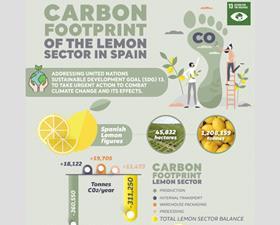
Ailimpo has published carbon footprint data for Spanish lemon sector showing that it now captures more than 300,000 tonnes of CO2 a year.
“From the farm until when the fruit leaves the packhouse or the processing plant, there are a number of fixed points where we can measure CO2 emissions,” the lemon and grapefruit interprofessional said.
“The aim of this report is to quantify them, and thus be able to calculate the sector's carbon footprint.”
Lemon plantations have a high capacity to capture atmospheric CO2 through carbon fixation, the process by which inorganic carbon is converted to organic compounds by living organisms. Ailimpo calculates that each year’s crop captures the equivalent of 360,550 tonnes of the gas.
At the same time, the sector emits 49,300 tonnes of CO2 a year – 18,122 tonnes in transportation, 19,705 tonnes at packhouse level and 11,472 in processing plants. This gives a net CO2 saving of 311,250 a year.
Therefore,the lemon sector in Spain contributes actively to the fight against climate change by being a real CO22 sink.
“The high CO2 fixation figures indicated are due to the implementation of increasingly sustainable practices by our producers,” Ailimpo said.
For example, the shredding and incorporation of pruning residues reduces the evaporation of water from the soil and increases the organic matter in the soil, thereby increasing the CO2 stored in the soil.
The use of localised irrigation systems on the vast majority of plantations without soil tillage also means that no fossil fuels are consumed in soil preparation. Moreover, no tillage leads to less mineralisation activity of organic matter, which favours the fixation of more carbon in the soil.
“The optimisation of irrigation and the use of techniques such as moisture probes, mulch nets to reduce evaporation or the Controlled Deficit Irrigation technique, leads to a reduction in water consumption and therefore a reduced need for electrical energy for irrigation, reducing emissions,” Ailimpo explained.
Finally, a big increase in organic cultivation has helped cut emissions as the net fixation in organic farms is higher than in conventional farming. Between 2012 and 2019, Spain’s organic lemon acreage increased from 1,708ha to 7,117ha.
Although the sector is a net fixer of atmospheric CO2 and its carbon footprint is very favourable, Ailimpo believes it could go even further and has made a series of recommendations for the coming years.
These include making continued improvements to irrigation; increasing organic matter in soil; promoting organic farming and biological and biotechnological controls to reduce the number of phytosanitary treatments; increased use of renewable energy and switching to low-emission or electric vehicles.



